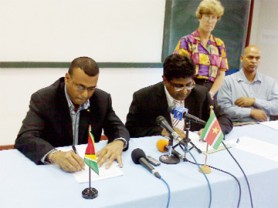Guyana and Suriname have agreed to cooperate and exchange expertise in the management of pests, in particular in plantains and bananas in the initial stage.
Both countries have also expressed awareness of the prevalence of the Carambola fruit fly, which they noted can best be addressed at the regional level.

The Suriname Minister of Agriculture, Animal Husbandry and Fisheries, Kermechend Raghoebarsing and Guyana’s Minister of Agriculture Robert Persaud met in Paramaribo, Suriname on Tuesday and discussed cooperation in agriculture and related fields between the two neighbouring countries.
In a joint statement, both ministers underscored that cooperation between the two important agricultural countries can benefit agricultural development as well as their respective citizens.
According to the joint statement, in border areas and points of entry attention will be paid to ensure that trade and transport of agricultural products will remain as liberal as possible and at the same time guarantee agricultural health and food safety.
Meanwhile, both countries will strengthen border inspection and surveillance mechanisms and provide travellers with adequate information.
Guyana and Suriname also declared a free flow of products that are in compliance with SPS (sanitary and phytosanitary) measures which will protect human, animal, or plant life from risks arising from the spread of pests, or diseases.
The two countries are important agricultural producers for their local consumption as for export and they both are implementing major diversification programmes, the statement noted.
In this regard, food safety and security will have a high priority in their policies and they will also invest significantly in food safety and security to the benefit of both consumers and producers.
It was decided also that both countries will set up a technical working group to coordinate these activities and frequently exchange information.
The ministers also discussed the importance of trade in agricultural products and stressed that this should be done in accordance to SPS measures.
The authorities in neighbouring Suriname had closed the ‘backtrack route’ (illegal route) as of August 17 across the Corentyne River to protect the agriculture sector in that country from the plant disease Black Sigatoka, stating that the disease was rampant in Guyana.
The authorities at Nickerie were directed to close down the illegal ‘backtrack’ route across the Corentyne River to protect the entire agrarian sector in that country, especially the banana sector, as a preventative measure from the yeast disease. According to reports, joint patrols of police and military along the Corentyne River had been increased as a result.
In the meantime, the Agriculture Ministry here had disputed the claim made by the Suriname authorities, noting that an unidentified disease had been found in isolated banana fields and was at a level which had not impacted banana production negatively, but it was being closely monitored by local and international technical staff.
Minister Persaud had noted that the collaborative efforts of the Inter-American Institute for Co-operation on Agriculture (IICA) offices in Guyana and Suriname had resulted in some scientific work being done in advancing the understanding of the disease. He said too that this study did not support the action taken by the Surinamese.
Persaud later directed the Chief Crops and Livestock Officer and the Technical Manager of the Plant Health Services to travel to Suriname to hold discussions with counterparts on ensuring effective cross-border phytosanitary measures.
He also encouraged Surinamese authorities to work collaboratively to take all measures to ensure that there was no disruption in cross-border trade with unaffected agricultural produce.
Persaud subsequently held discussions with his Surinamese counterpart in Paramaribo on the issue in question and other related matters.








